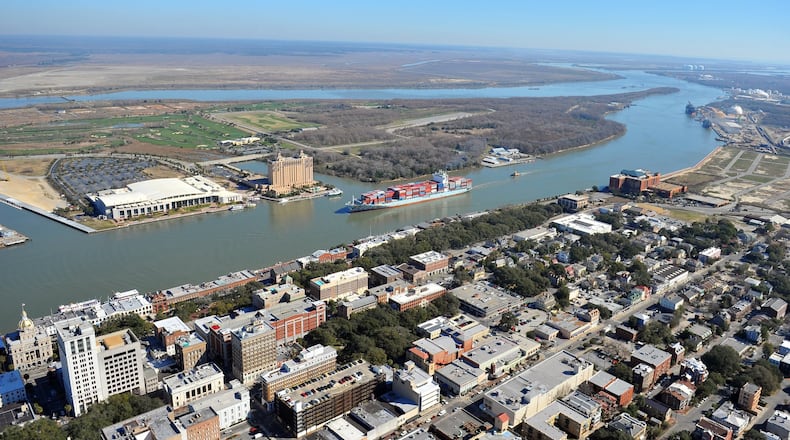TIMELINE
Key dates in the Savannah River deepening:
August 1996 — Ports and federal officials announce plan to deepen up to 48 feet.
August 1999 — Congress authorizes the project.
September 2007 — $5.2 billion Panama Canal expansion begins.
April 2012 — U.S. Army Corps of Engineers approves 47-foot deepening of Savannah.
October 2012 — Federal government gives final approval to deepen the river.
May 2013 — Environmental lawsuit settled.
January 2014 — Federal spending bill may, finally, allow deepening to begin later this year.
March 4 — Georgia formally learns the federal budget will include only $1.62 million for more study of the expansion, far less than expected and not enough to allow work to begin.
March 5 — Gov. Nathan Deal said the state is exploring options to float the full cost of the $685 million project.
How we got the story:
The deepening of Savannah’s port is Georgia’s top economic development priority, and The Atlanta Journal-Constitution has every angle covered. This report was the culmination of records requests, interviews with Gov. Nathan Deal and his staffers, and political gatherings held in the wake of the White House’s decision to hold off on funding the project.
Gov. Nathan Deal instructed state officials Wednesday to begin spending millions of dollars to buy property around Savannah’s port, the first step in the state’s new strategy to begin deepening the harbor on its own after the White House snubbed the project.
In a letter to U.S. Army Secretary John McHugh, Deal said the state will use "all lawful means" to move forward, including buying wetlands and right-of-way property around the harbor. The move comes a week after the Obama administration stunned Georgia by declaring the deepening, the state's top economic development project, wasn't ready to proceed.
Partly a legal briefing and partly a shot across the bow, Deal said language slipped into the federal spending plan earlier this year gives the state a two-year window to use state funds to prepare for the dredging. State officials downplay the risk of a legal battle, though it seems Georgia is fast engaging in a game of chicken with Washington over the project.
“We cannot wait any longer to move this important and nationally significant project out of regulatory purgatory,” Deal said in the letter, adding: “Georgia is committed to moving the project forward as quickly as possible.”
The port’s supporters hope that deepening the waterway from 42 feet to 47 feet would allow bigger ships coming through the expanded Panama Canal to dock in Savannah and keep the port competitive with rivals. The port is considered a key engine in metro Atlanta’s economy, supporting thousands of jobs here because goods it handles flow through the region’s logistics centers.
Army officials did not immediately comment, though the White House has said it cannot fund the project until lawmakers approve a water resources bill that has been tied up in a conference committee for months. Republican Rep. Jack Kingston of Savannah, one of the project's key supporters, predicted that Congress will strike a compromise over the plan in April.
There are no guarantees, though, and in the meantime a port project that was once a shining example of bipartisan cooperation is at the center of an intense political fight.
Atlanta Mayor Kasim Reed, who has partnered with Deal to try to squeeze cash out of the White House for the project, has urged politicians to tone down the rhetoric and "maintain this bipartisan focus." But other Democrats have cast blame at the Obama administration or deflected criticism toward Deal.
Republicans, meanwhile, have signaled that the port will be at the center of the party's hopes to retain the Governor's Mansion and keep an open U.S. Senate seat in GOP hands. At a debate in Macon on Saturday evening, several Republican hopefuls for the Senate attacked Vice President Joe Biden's "come hell or high water" vow that the port would be dredged.
“If you want to know the difference between Democrats and Republicans and you want a reason to vote Republican, Vice President Joe Biden gave it to us,” said Kingston, who has been working on the project for more than a decade.
Added Rep. Phil Gingrey: “I guess hell and high water both came.”
Georgia plans to set aside $266 million toward the $685 million project, and Deal has said he’s willing to explore floating bonds or forming a public-private partnership to pay for the rest if Washington doesn’t chip in. His office began hearing rumblings about the snub days before it became official.
The worries were reinforced early March 3 when Fred Caver, an ex-Army Corps of Engineers employee who is now a private consultant, sent a note to a few ports workers with the message: "Get your news release ready. Just got the bad news."
The next day, as word about the setback leaked, Deal's office scrambled to assess its options. Bart Gobeil, Deal's chief operating officer, wrote in a note to his staff that Deal was "just flummoxed" by the White House's seeming change of heart.
“We’re still trying to figure out how the administration can legally ignore the language inserted into the recently passed omnibus appropriations act,” wrote Gobeil, who said he’s confident legislation that has already passed would allow the corps “to move forward in a meaningful way” on the dredging.
The governor said he still holds out hope for a reversal this year. He told an audience Tuesday evening that the president’s budget is merely a “blueprint to Congress” that doesn’t slam the door on more funding down the road.
“The state is ready to move forward,” he said. “We are going to do everything we can with our own money as a preliminary preparation. We don’t have any time to lose, folks.”
About the Author





